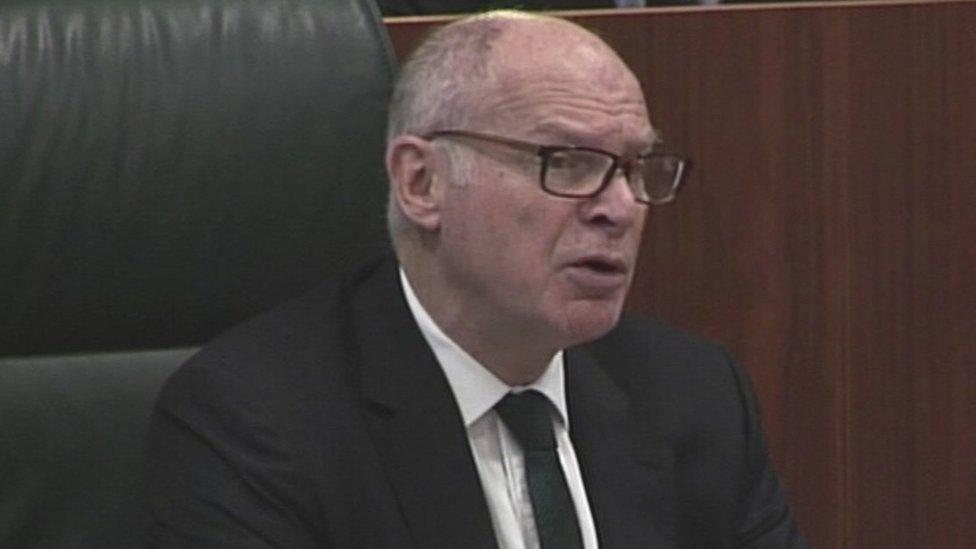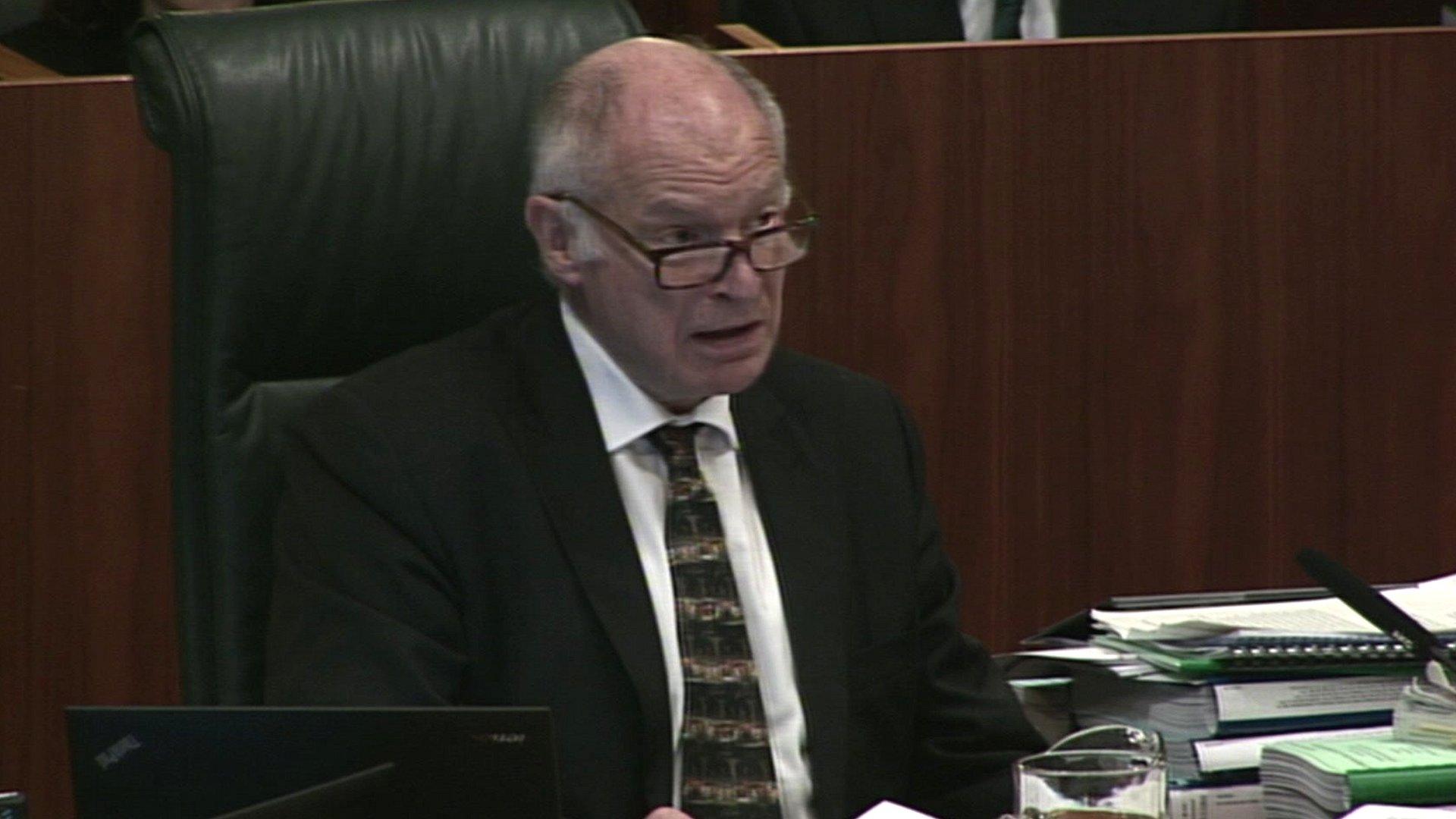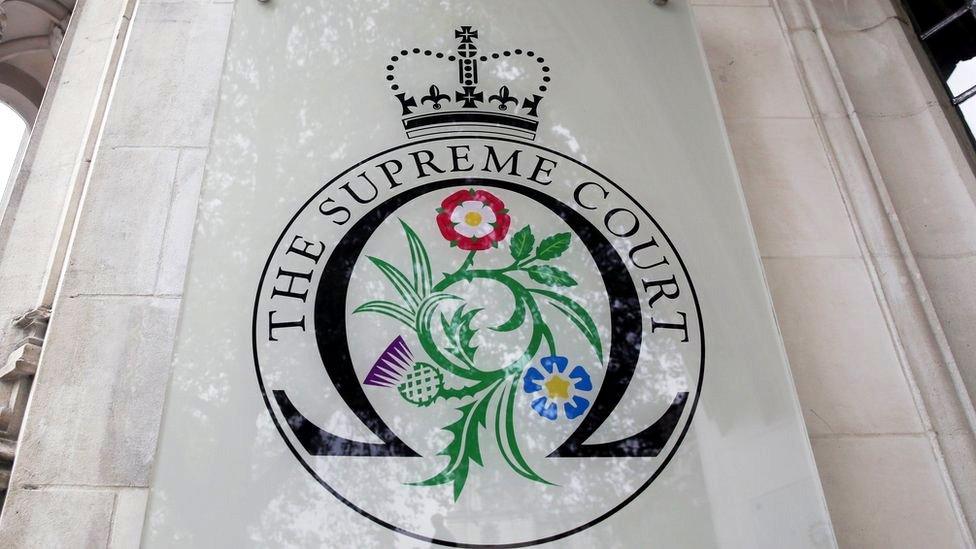Brexit: Ministers 'not legally compelled' to consult AMs
- Published
- comments
Supreme Court President Lord Neuberger said ministers were 'not legally compelled' to consult AMs
The Welsh Assembly does not have a legal right to be consulted by UK ministers triggering Brexit, the Supreme Court has ruled.
Senior judges said that the UK government cannot start Article 50 without consulting MPs.
They said assembly members have no veto over the process to leave the EU.
But the Welsh Government's chief legal officer Mick Antoniw called the ruling "a victory" in upholding the sovereignty of Parliament.
Welsh ministers had argued that the assembly should be consulted on starting Brexit. They had intervened in the UK government appeal against an earlier High Court ruling.
Counsel General Mr Antoniw told the assembly on Tuesday that AMs are likely to vote on Brexit, despite the ruling, although he said it was not a veto.
Giving the judgement on Tuesday, President of the Supreme Court Lord Neuberger said: "On the devolution issues, the court unanimously rules that UK ministers are not legally compelled to consult the devolved legislatures before triggering Article 50.
"The devolution statutes were enacted on the assumption that the UK would be a member of the EU, but they do not require it.
"Relations with the EU are a matter for the UK government."
The ruling said the assembly and other devolved legislatures had no veto.
But it did say withdrawal from the EU will change the powers of the governments and assemblies in Wales, Scotland and Northern Ireland.
Mick Antoniw says Parliamentary sovereignty means the Welsh voice will be heard
The Welsh Government had argued that if MPs did not vote on Article 50, which was the UK government's original intention, it would undermine the basis for devolution.
Welsh ministers had also argued that this plan would have short-circuited a convention which requires Welsh assembly members to vote on legislation which affects the Welsh devolution settlement.
Political, not legal
The Sewel Convention is an arrangement between the UK and Welsh governments where if any new laws come in that affect devolution, they have to be approved by AMs by a vote.
But the Supreme Court ruling sets out that Sewel is a political convention and not a legal one, and so is not a legally enforceable obligation.
The assembly research service states, external the court is not giving the UK government and Parliament license to ignore Sewel, but it cannot decide disputes about whether it had been applied correctly.
Mr Antoniw, Welsh Government's senior legal advisor and am AM, told BBC Wales the ruling was "certainly a victory in terms of upholding the sovereignty of Parliament".
"We've never argued for a veto, and the court made that point, but what it does do is stress the importance of the Sewel Convention in terms of engagement."
Earlier, speaking to BBC Radio Wales before the judgement, Mr Antoniw defended the £84,000 cost of the Welsh Government's intervention, saying: "The voice of Wales within the UK constitution is priceless."
Plaid Cymru spokesman for external affairs Steffan Lewis said the party would still seek to table a vote in the assembly on the triggering of Article 50.
"It is a simple matter of democracy that the devolved legislatures should have a role in commencing the process of leaving the EU," he said.
Nathan Gill says the Welsh Government's Brexit legal bill could have paid for four nurses
UKIP MEP and independent AM Nathan Gill said the Brexit white paper published by the Welsh Government on Monday "will make it into the Guinness Book of Records for having the shortest shelf life ever, 24 hours".
"Because it's now been made obsolete," he claimed.
But Mr Gill - a member of the committee advising First Minister Carwyn Jones on Brexit - said the Supreme Court judgement in favour of parliament was "no surprise".
An UKIP assembly group spokesman said it welcomed the judgement on Article 50 and Parliament, and that any attempt to block Brexit would trigger an immediate general election: "We say bring it on."
"It would be absurd for Wales, Scotland, Northern Ireland to have a veto over triggering Article 50," he said.
The Welsh Conservatives' Europe spokesman Mark Isherwood, said: "The Welsh Government's tortuous arguments were an expensive sideshow.
"It would have been better if every effort had been focused on delivering a Welsh Government paper on Brexit before the UK government announced its negotiating strategy."
Welsh Liberal Democrat leader Mark Williams welcomed the ruling, saying it showed the sovereignty of parliament was paramount, and that his party will vote against Article 50.
Owen Smith says the public should be given a vote on any "hard, hard Brexit" deal
Several Labour MPs have indicated they will disobey any order by party leader Jeremy Corbyn to vote in favour of Article 50.
Pontypridd MP Owen Smith, who backed Remain, suggested there ought to be a fresh referendum on the terms of leaving the EU, fearing the UK was set for the "hardest of hard Brexits" by leaving the single market and the customs union.
"The right thing to do then is to allow the British people once more in an ultra-democratic moment to confirm whether they really want the hard, hard Brexit they are likely to get," he said.
- Published24 January 2017

- Published8 December 2016
- Published8 December 2016

- Published5 December 2016

- Published5 December 2016

- Published27 November 2016

- Published4 November 2016

- Published17 October 2016
